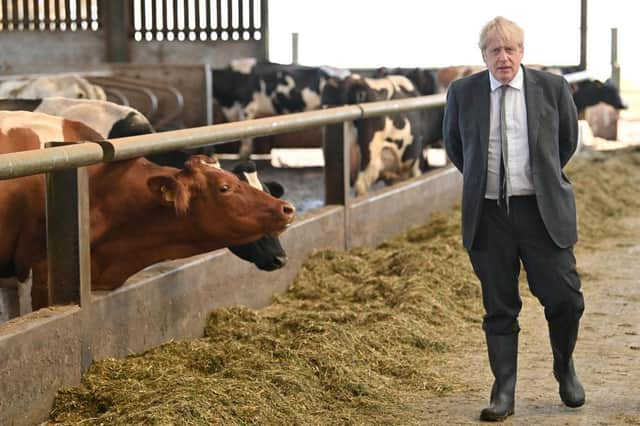Farmers need help, not a ‘foustie neep’ - Andrew Arbuckle


I had been eavesdropping when I heard this description of our Prime Minister which seemed to fit the man most wonderfully. The topic under discussion was Partygate and, more specifically, Boris Johnson’s role in it as either gate crasher or party organiser.
I had been attracted to what had initially appeared to be an optical illusion but as I walked more closely to it, I could swear I saw the sides of the beer tent bulge as I wandered about at the local agricultural show. Closer still, I could confirm it was definitely not an illusion as I heard a cacophony of voices therein with everyone in the tent simultaneously catching up on two years’ worth of chat.
Advertisement
Hide AdAdvertisement
Hide AdAdmittedly, such a boisterous situation was not news if you were involved in the No.10 parties which seemed to be held on a regular basis without even a nod in the direction of social distancing or concern over spreading Covid.
But now, with the threat of Covid receding a little from the headlines, events such as agricultural shows which form an essential part of the rural community are back. This easing of restrictions allows those of us living and working in the countryside to believe that we are still part of society, and this noisy gathering was filling a “gossip gap” that had existed for the previous 24 months
Zoom and Team meetings had helped fill the chasm in rural communications but two-dimensional talking heads never really filled the void that existed for all who followed Covid recommendations.
Leaving the Partygate huddle which I would describe as being at the “chaff” or lower end of the gossip spectrum in the beer tent, I stepped unwittingly into a discussion on how much farming had slid down in importance in Government policy making since the country had been locked down with Covid restrictions.
Both north and south of the Border, very little appears to have come from either the Scottish or English Governments in terms of revealing post-EU CAP policies. The Scottish and English NFUs have both expressed frustration at the snail-like approach to reform that typifies governmental future thinking on farming. It is no wonder that, last week, Scottish NFU president Martin Kennedy blasted the latest roadblocks towards policy progress in a blog post. Using his own land in Highland Perthshire to provide evidence, Kennedy described the efforts of organisations to build future farm policy on environmental priorities rather than on food production as “extremely dangerous.” This was widely supported by farmers who see the end of their current support scheme but no firm outline of a replacement policy as a threat to their businesses.
Meanwhile in England, progress towards their flagship policy of Environmental Land Management schemes progresses slowly, with a target completion date not until 2028, with that date and the support money involved dependent on increasingly constrained budgets.
Another example of how far farm policies seem to have drifted in recent times will come today when a policy paper for the future of food production in England is published. There is no need for farmers to hold their breath and hope it will be filled with lofty intentions such as increasing the country’s food security and reducing the UK’s reliance on imports. It does mention reducing methane gas by concentrating on less flatulent cattle and urges more consumption of venison, not the farmed kind but from the deer roaming the hills.
Opposition politicians have mocked the leaked document as preposterous with no proposals on how to deal with food prices. Environmental pressure group Greenpeace described the 27-page paper as “worse than half baked”. The “foustie neep” likes to compare himself with wartime leader Winston Churchill. Far from showing an aptitude for winning wars, he is in danger of losing the farming industry, He may have already done so.
Subscribe at www.scotsman.com/subscriptions
